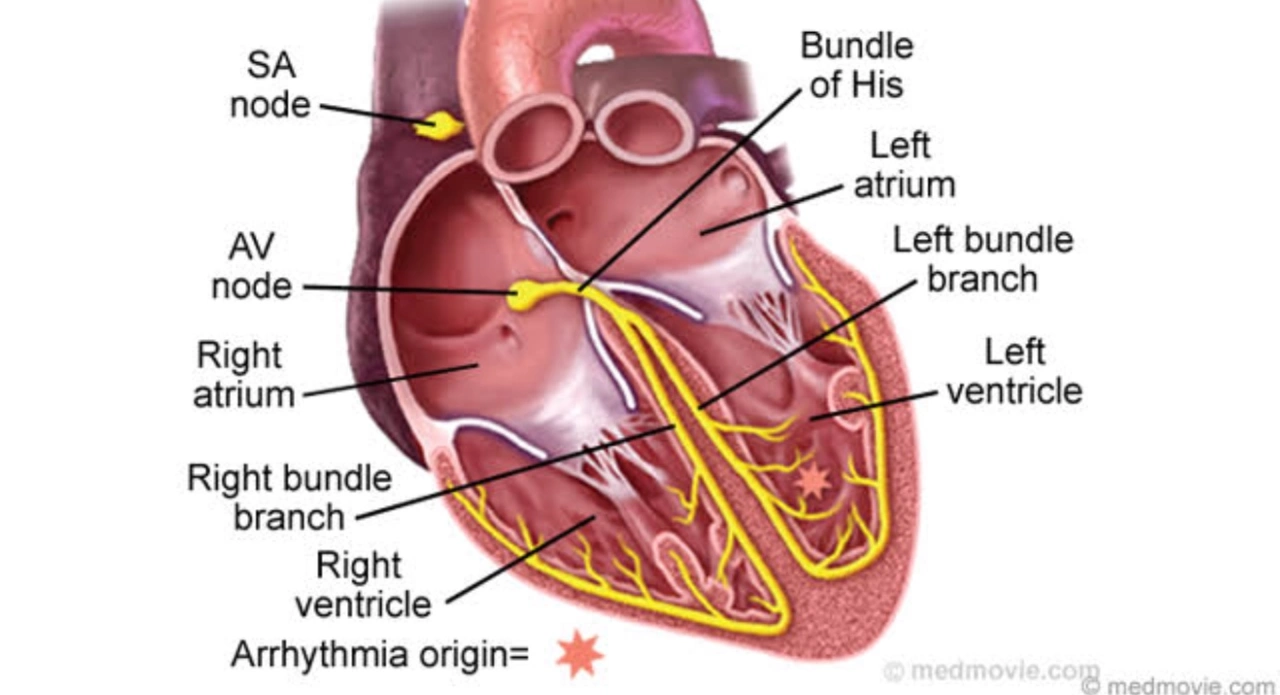Introduction: Understanding Atrial Fibrillation and Its Connection to Smoking
Atrial fibrillation, commonly known as AFib, is a condition where the heart's upper chambers (atria) beat irregularly and rapidly. This can lead to a variety of complications, including blood clots, heart failure, and stroke. In this article, we will discuss the dangers of AFib and its link to smoking, as well as provide tips on how to quit smoking for better heart health.
The Impact of Smoking on Atrial Fibrillation Risk
Research shows that smoking is a significant risk factor for atrial fibrillation. It increases the risk of developing AFib by nearly two-fold. This is because smoking damages the heart's electrical system, making it more susceptible to abnormal heart rhythms. Additionally, smoking can also cause inflammation and oxidative stress, which may contribute to the development of atrial fibrillation.
How Smoking Affects the Severity of Atrial Fibrillation
Beyond increasing the risk of developing AFib, smoking can also worsen the severity of the condition. Studies have shown that smokers with atrial fibrillation tend to have more frequent episodes, longer-lasting symptoms, and a higher risk of complications. Furthermore, smokers are less likely to respond to treatments for AFib, such as medications and ablation procedures, making it harder to manage the condition.
Increased Risk of Stroke and Heart Failure
One of the most significant dangers of atrial fibrillation is the increased risk of stroke and heart failure. Smoking amplifies these risks even further. Smokers with AFib have a higher chance of blood clot formation, which can lead to stroke. Moreover, smoking can cause further damage to the heart muscle, increasing the likelihood of heart failure. By quitting smoking, individuals with atrial fibrillation can significantly reduce their risk of these life-threatening complications.
Benefits of Quitting Smoking for Atrial Fibrillation Patients
Quitting smoking is not easy, but it is essential for individuals with atrial fibrillation. The benefits of quitting smoking include improved heart function, reduced inflammation, and a decreased risk of stroke and heart failure. Furthermore, quitting smoking can improve the effectiveness of AFib treatments, helping individuals manage their condition better and experience fewer symptoms.
Strategies for Quitting Smoking
There are numerous strategies available to help individuals quit smoking. These include nicotine replacement therapy (NRT), behavioral therapy, support groups, and prescription medications. It is important for each person to find the method that works best for them and consult with their healthcare provider to develop a personalized quit plan.
Nicotine Replacement Therapy (NRT)
Nicotine replacement therapy involves the use of products that provide low doses of nicotine, without the harmful chemicals found in cigarettes. This can help reduce withdrawal symptoms and cravings, making it easier for individuals to quit smoking. Common NRT products include nicotine gum, patches, lozenges, and inhalers.
Behavioral Therapy
Behavioral therapy can help individuals identify and cope with triggers that lead them to smoke. By working with a therapist or counselor, individuals can develop new ways to manage stress and avoid situations that may lead to smoking. This can be a valuable tool in the journey to quit smoking.
Support Groups
Joining a support group can provide individuals with encouragement, motivation, and practical advice from others who are also trying to quit smoking. These groups can be found in person, online, or through telephone helplines, offering a variety of options to suit each person's needs and preferences.
Prescription Medications
There are several prescription medications available that can help individuals quit smoking. These medications work by reducing cravings and withdrawal symptoms, making it easier to quit. Some common medications include bupropion (Zyban) and varenicline (Chantix). It is essential to consult with a healthcare provider before beginning any medication to ensure it is safe and appropriate for each individual.
Seeking Help from Healthcare Professionals
Quitting smoking is a challenging journey, but it is crucial for individuals with atrial fibrillation to improve their heart health and reduce the risk of complications. It is essential to seek guidance and support from healthcare professionals, such as doctors, nurses, and therapists, to develop a personalized quit plan and access the appropriate resources and treatments. With determination and the right support, quitting smoking is achievable, and the benefits to heart health are well worth the effort.





When we talk about atrial fibrillation, it’s helpful to frame the discussion in terms of electrophysiological remodeling – the way nicotine disrupts ion channel homeostasis and promotes ectopic firing. Smoking also induces systemic inflammation, which accelerates atrial fibrosis and creates a substrate for re‑entry circuits. The synergistic effect means that a smoker with AFib typically experiences higher burden and reduced responsiveness to anti‑arrhythmic drugs. From a therapeutic standpoint, emphasizing cessation early can blunt these maladaptive pathways and improve long‑term rhythm control. Let’s keep the conversation grounded in the mechanistic data while staying supportive of anyone taking the first step toward quitting.
Look, the mainstream narrative pushes cigarettes as a personal choice, but the hidden agenda is to keep you hooked while your heart deteriorates. They’ll tell you that nicotine patches are “safe,” yet the same corporations fund studies that downplay the vascular toxicity. It’s no coincidence that the prevalence of AFib spikes in regions with aggressive tobacco lobbying. Wake up to the fact that your freedom is being eroded, one puff at a time, and the payoff is a broken heart. The only real rebellion is to dump the habit and reclaim control of your cardiac rhythm.
The relationship between smoking and atrial fibrillation is a microcosm of how lifestyle choices echo through the body’s electrical architecture. Nicotine, as a potent sympathomimetic, elevates catecholamine levels, which in turn increase heart rate and reduce atrial refractory periods. Shortened refractory periods predispose the atria to multiple wavelets, the very essence of the chaotic rhythm we label AFib. On top of that, the oxidative stress generated by tobacco smoke triggers endothelial dysfunction, compromising the nitric oxide pathway essential for vascular health. Endothelial dysfunction not only facilitates a pro‑thrombotic state but also fuels atrial inflammation, a known precursor to structural remodeling. Structural remodeling manifests as fibrosis, which creates heterogeneous conduction pathways that act like electrical roadblocks. These roadblocks force impulses to detour, generating the re‑entry circuits that sustain AFib episodes. Clinical studies consistently demonstrate a near‑doubling of AFib incidence among smokers compared to non‑smokers, underscoring the epidemiological weight of this connection. Moreover, the severity of AFib-frequency of episodes, symptom burden, and resistance to pharmacologic therapy-appears amplified in the smoking cohort. The therapeutic implications are profound: patients who continue to smoke often experience diminished efficacy of rate‑control medications and poorer outcomes after catheter ablation. From a public‑health perspective, targeting smoking cessation becomes a non‑pharmacologic lever that can shift the trajectory of AFib management. Quitting smoking initiates a cascade of physiological reversals, including reduced sympathetic tone, lowered inflammatory markers, and gradual restoration of endothelial function. Within weeks, heart rate variability improves, suggesting a rebalance of autonomic inputs that favor sinus rhythm stability. Over months, the progressive attenuation of atrial fibrosis can be observed, offering a tangible window into the heart’s capacity for remodeling when the toxic insult is removed. In sum, the evidence converges on a clear message: smoking is not just a habit; it is an active driver of the electrophysiological and structural derangements that underlie atrial fibrillation, and abandoning it can fundamentally alter the disease’s natural history.
While the data are compelling, it remains essential to approach smoking cessation with a tailored plan that respects individual preferences and clinical context. Evidence‑based interventions, such as nicotine replacement therapy combined with behavioral counseling, have demonstrated superior quit rates compared to monotherapy. Patients should be encouraged to discuss these options with their cardiology team to ensure optimal integration with AFib management. The goal is a seamless transition that minimizes withdrawal while maximizing cardiovascular benefit.
For anyone thinking about quitting, start by setting a firm quit date and let your support network know it-friends, family, even coworkers can keep you accountable. Consider using a combination approach: a nicotine patch for steady dosing plus gum or lozenges for breakthrough cravings. And don’t forget to schedule a follow‑up with your doctor to adjust any AFib meds that might need tweaking during the withdrawal phase.
Totally solid info, thanks!
Get a quit plan on paper, stay active, and keep the heart happy.
It's worth noting that prescription medications such as varenicline have been shown to double cessation success rates in clinical trials, though they require careful monitoring for mood changes. Discuss potential side effects with your physician before starting. Combining pharmacotherapy with counseling often yields the best outcomes.
The heart’s rhythm mirrors the cadence of our choices; each cigarette is a discordant note that reverberates through the atrial chambers. By silencing that noise, we allow the natural tempo to resurface, harmonizing pulse and pulse‑wave alike. In that silence, the body can reclaim its intrinsic regulatory mechanisms.
One might argue that the correlation between smoking and AFib, while statistically significant, does not unequivocally establish causation, given potential confounding variables such as alcohol consumption and underlying hypertension. Nonetheless, the preponderance of mechanistic studies supports a plausible pathophysiological link. Therefore, clinicians should remain vigilant but also consider the broader risk profile when advising patients.
Thank you for the thorough breakdown, Kristin! 🙏 Your explanation of electrophysiological remodeling really clarifies the stakes. I’ll definitely share this with my cardiology group.
Oh sure, because the tobacco industry is secretly plotting to make our hearts beat faster for profit. 🙃 Thanks for the drama, Theo.
Wow, that's a lot of science! lol u really dug deep 🧐
Good point, Lisa. I’d add that tele‑health counseling can make the behavioral component more accessible, especially for patients with busy schedules.
Diane, your step‑by‑step checklist feels like a battle plan for the heart. When the nerves fire and cravings strike, having that concrete roadmap can be the difference between relapse and victory.
So concise it hurts, Michael.
Jeremy, your mantra is practically a rallying cry-paper plan, active lifestyle, happy heart. Let’s turn that into a movement!
Nelson, good info. I think varenicline can help but watch for mood changes.
Wilson, love the poetic vibe. Quiet heart beats are the best beats.
Thanks for the balanced view, Narasimha. It’s good to remember context while we push for healthier habits.